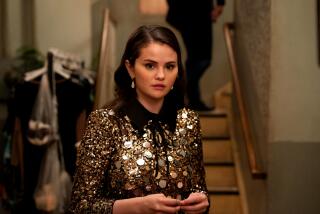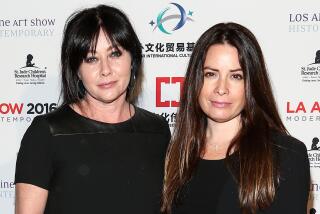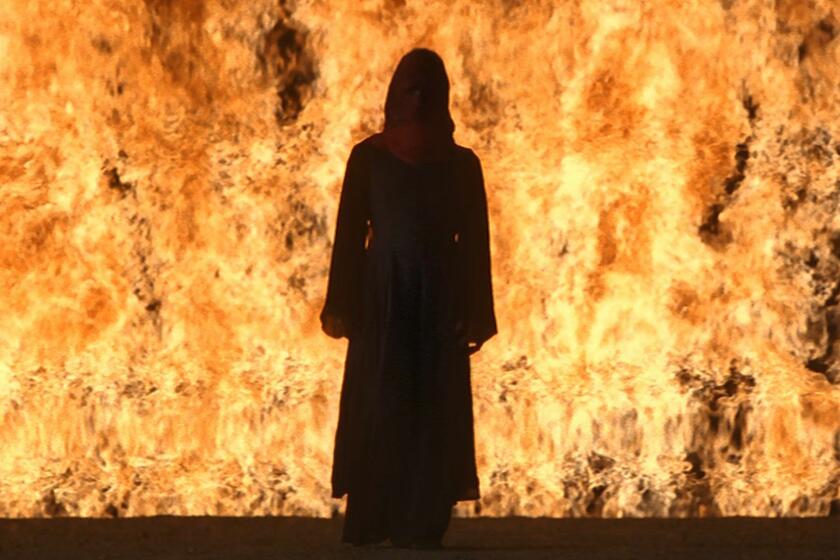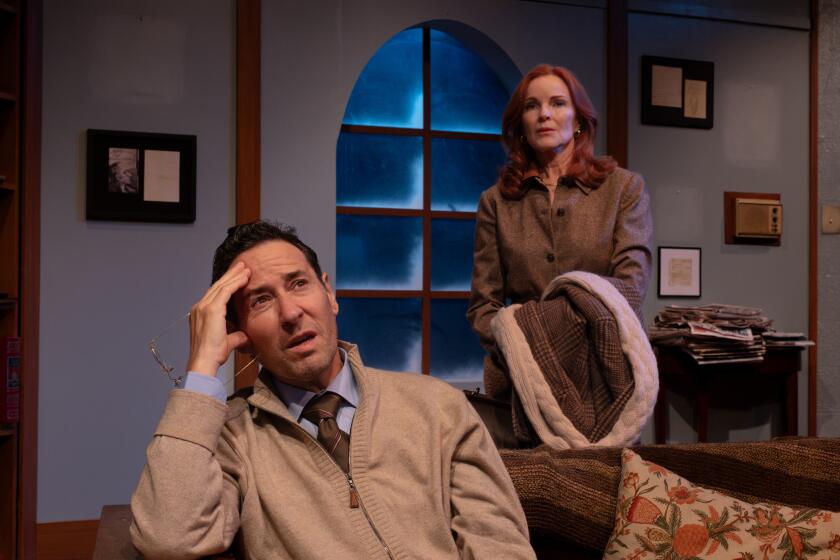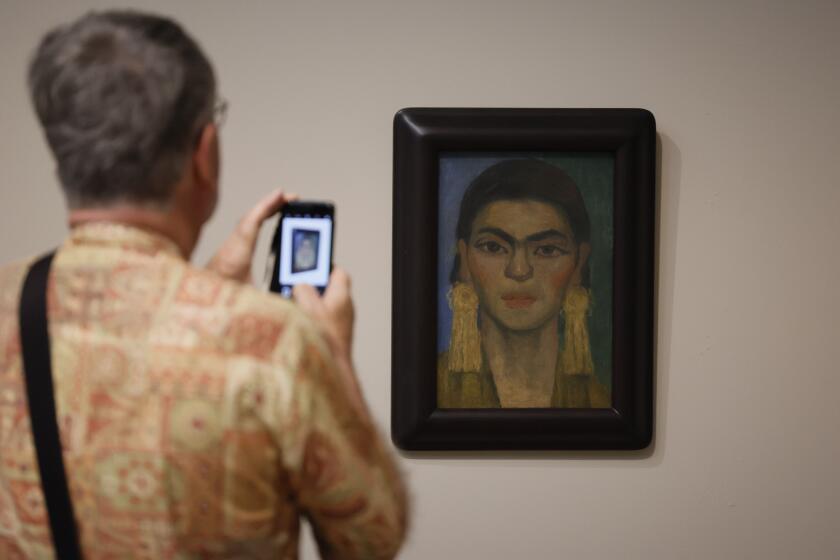When Serious Art Meets Pop Culture : Music: Rock influences Christopher Rouse, yet his work is frequently dark. Consider his Cello Concerto, created for the Philharmonic’s 75th birthday.
Christopher Rouse, the composer who won the Pulitzer Prize in music last year, likes to laugh, likes to talk, likes loud music, likes rock and roll, likes to be slightly outrageous.
Some years ago, when composer-in-residence of the Baltimore Symphony, he orchestrated “Twist and Shout” as an encore piece for the orchestra’s tour of the then Soviet Union. He famously describes what is probably his best-known orchestra piece, “Bump,” as the Boston Pops in Hell.
When an interviewer phones him at his home in Rochester, N.Y., to talk about his new Cello Concerto, which the Los Angeles Philharmonic will premiere tonight with Yo-Yo Ma as soloist, the call happens to come in a couple of minutes early, interrupting the conclusion of his favorite afternoon soap opera. At the end of the conversation, he jokes about the new concerto being so depressing that he advises not bringing any knives or poison to the Dorothy Chandler Pavilion.
He jokes. But he is also deadly serious. The Cello Concerto is not a happy piece. Its tone is not celebratory, although it was commissioned to celebrate the Philharmonic’s 75th anniversary this season. The piece also honors Betty Freeman, the Los Angeles philanthropist who financed the commission and about whom Rouse, in dedicating the concerto to her, says he is expressing his gratitude for all she has done to foster new American music, not just his.
Still, it is a somber concerto. Its subject is death, and our longing to transcend it. If that sounds just too uncheery, it is worth recalling that such is a subject made for music. Many beloved pieces are death-transcending, including, of course, Strauss’ “Death and Transfiguration,” Wagner’s “Tristan und Isolde” and a great deal of religious music (especially Bach’s).
Indeed, Rouse’s concerto may prove--as did John Corigliano’s so-called “AIDS” Symphony recently and the chart-busting Gorecki Third Symphony--to be just the serious music to express what is on so many people’s minds these days. If death preoccupied Rouse, it is, he says, because of the deaths of three colleagues and close friends, the composers Sir Andrej Panufnik, William Schumann and Steven Albert, who died in 1991 and 1992 and who are all quoted in the score, as are a couple of poignant moments from Monteverdi. A bad time for music--during the gestation and composition of the score, Rouse notes, Olivier Messiaen and John Cage also died.
*
Clearly there is no place, in what Rouse describes as his darkest work, for the more antic side of the 44-year-old composer. But Rouse is a dramatic composer who happens to feel that his oft-noted love for ‘60s rock ‘n’ roll is not anything peculiar for a serious composer. “I think a lot of people retain a fondness for the popular music they grew up with. In my case that was rock ‘n’ roll, and it may or may not find its way into my work.
“I had the great good fortune of being in high school during the years of the Beatles at their height, the Rolling Stones, the Byrds. To me it still is a wonderful repertoire of music. So it wasn’t so much a conscious decision on my part to say, ‘Oh boy, I’m going to use rock ‘n’ roll in my music and make a big impression.’ It just seemed a natural thing for me to do.”
It also seemed natural for Rouse, who teaches at the Eastman School of Music in Rochester, to bring his passion for rock to his students. But Rouse’s rock history course, the first fully accredited in the subject to be offered at a music school, has no politically correct agenda, no social theory about popular culture associated with it. Rouse says he simply found his students ignorant of his favorite period, from the Beatles to the end of the decade.
*
“When I first taught about this in ‘79, I found that students already didn’t really have memories that went back much beyond Peter Frampton. So when you told them about the Supremes or the Four Tops or the Moby Grape, this was all new repertoire. As I’ve continued to teach the course, people tend not to know much about pop music before Madonna. So it’s that much broader a spectrum of music that I could expose them to.
“To me it’s partly an act of proselytization. Ultimately, the goal is just to get them excited about it, which I would hope is the purpose of any music course.
Still, Rouse realizes that popular music is popular music, and, as a kid growing up in Baltimore, he did make the decision to go into serious composition, studying at Oberlin and Cornell, and finding that the great, serious works of the Western culture ultimately had more sway. And whether his own works, which include several recent concertos, allude to the popular world or not (they just as well might be Shostakovich or Bruckner obsessed), there is always a sense of dramatic immediacy about them. (It was a compellingly theatrical Trombone Concerto, premiered last year, that won him the Pulitzer.)
Such drama, grim though it might be, seems to characterize the new Cello Concerto, as well. Rouse describes the solo cello as the everyman spirit that in the first movement does battle against the orchestra.
The cello, stung, flies into a wild cadenza. The second movement is, Rouse says, “almost entirely quiet, which is something people don’t associate with me. I had in mind the split second in real time between life and death, where one is neither alive nor dead, but just there on the cusp. I extended that into about 12 minutes.” The cello dies, trailing off into nothing. The wooden percussion has a triumphant hiss by themselves.
Although Rouse offered this description a couple of days before the Los Angeles earthquake, his music antennae this time seemed eerily prophetic, attuning to just the kind of music likely to mean the most to a jittery audience.
More to Read
The biggest entertainment stories
Get our big stories about Hollywood, film, television, music, arts, culture and more right in your inbox as soon as they publish.
You may occasionally receive promotional content from the Los Angeles Times.

